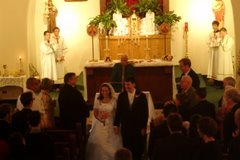
John 11:25-26
Jesus told her, "I am the resurrection and the life; whoever believes in me, even if he dies, will live, and everyone who lives and believes in me will never die. Do you believe this?"
Today is All Souls' Day - The commemoration of all the faithful departed is celebrated by the Church on November 2nd. The theological basis for the feast is the doctrine that the souls which, on departing from the body, are not perfectly cleansed from venial sins, or have not fully atoned for past transgressions, are debarred from the Beatific Vision, and that the faithful on earth can help them by prayers, almsdeeds, and especially by the sacrifice of the Mass. We pray for the souls in purgatory.
From the beginning, Christians have prayed for the dead and have undertaken works of penance on their behalf. There is scriptural basis for this intercessory prayer for the sins of others and for the dead in the Old Testament. Job's sacrifices purified his sons (Job 1:5); and Judas Maccabeus "made atonement for the dead that they be delivered from their sin" (II Macc 12:46).
The tradition in the Church of having Masses said for the dead began in the earliest times. The pre-Christian Roman religion, which held that some form of life continued after death, gave votive offerings to the gods for the dead at three specified times: the third, seventh and thirtieth day after death. This practice of praying for the departed on these same days was adopted ("inculturated") by the early Christians -- and continued in the Church for nearly 2000 years: the Church offered Masses for the deceased person on the third, seventh and thirtieth day after death.
Beginning in the year 998, All souls -- the "faithful departed" -- were officially remembered in the Church's prayers on the evening of November 1st, and with Requiem Masses, Masses for the dead, on November 2. All Souls Day is now a feast of the universal Church.
We pray for the faithful departed, those who have been baptized, but who need to be completely purified of all stain of sin before they come into full union with God in Heaven. In other words, most of us. The Church's teaching about Purgatory, the place of purification, is explained in the Catechism of the Catholic Church (§1030-1032).
Requiem Æternam
Réquiem ætérnam dona eis, Dómine,et lux perpétua lúceat eis.Requiéscant in pace. Amen.









No comments:
Post a Comment